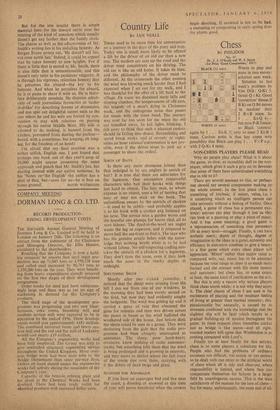Chess
13v PHILIDOR
Nu. 31 Dr. J. J. O'Keeto and W. J. Smith Prizti 'Good Companions,' 19171
BLACK (12 men) 8 men I WHITE to play and mate in two moves: solution next week.
Solution to last week's problem by Van Dijk: Q-Kt 5, threat Q x Kt. Good 'correction' theme.lf B Kt on Q 114 moves 'at random' then 2 B x13 mate. So
I . . . Kt-Q 6;— but now P-B 3 mate;
so Black 'corrects' again by 1 . . . Kt-K 5; only to meet 2 Kt-I.1 3 mate. Curious point is that key copes with possibility that Black can play 1 . P x P e.p.; with 2 Q-Kt 4 mate.
NON-CHESS PLAYERS PLEASE READ
Why do people play chess? What is it about the game, so slow, so incredibly dull to the non- player, which gives it such a grip on its devotees that some of them have subordinated everything else in life to it?
There are several answers to this, or perhaps one should say several components making up the whole answer. In the first place chess is something of intrinsic, if minor, value, i.e. it is something which an intelligent person can take seriously without a feeling of futility. Once played, a game of chess has a permanent exis- tence; anyone can play through it just as they can look at a painting or play a piece of music. And it has some meaning; a good game is a representation of something that permeates life at every level—struggle. Finally, it can have aesthetic merit; depth of thought, degree of imagination in the ideas in a game, economy arid efficiency in execution combine to give a beauty to a fine game which every chess player will appreciate. 'Minor' rather than major value as compared with, say, music has to be admitted because the total range in chess is so much more limited and -the contact with life more remote and narrower; but chess has, to some extent at least, the same kind of justification as the arts.
but this is only a reason why serious players think chess worth while; it is not why they enjoy it. The chief' charm of chess I am sure is the excitement of playing and the resultant feeling of living at greater than normal intensity; this. paradoxically but naturally, is caused by its slowness combined with the knowledge that the slightest slip will be fatal which results in a gradual building-up of tension throughout the game. In these respects chess resembles cricket just as bridge is like tennis—and all right- minded readers will agree that Wimbledon is as nothing compared with Lord's.
Finally (or at least finally for this article), chess is to some players a substitute for life. People who find the problems of ordinary existence too difficult, too untidy or too serious to be dealt with can retire to the artificial world of chess where all is tidy and clear-cat, where responsibility is limited, and where they can compensate themselves for failures in a larger field by unambiguous success. This is the least satisfactory of the reasons for the lure of chess— but for many, unfortunately, the most real of all.


































 Previous page
Previous page